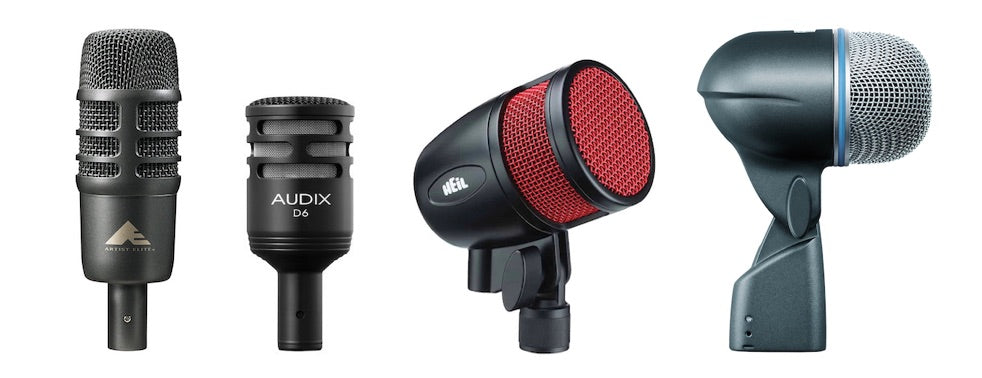by Eric Chancey, @BigDaddyDecibel
One could say that the kick drum (bass drum) sound is the signature of any song. Rap, Rock, Jazz, R&B all have distinctive kick drum sounds that help define those genres. With that in mind, picking the right tool will make creating the sound a lot easier. Here are some tips for making the proper purchasing decision.
Frequency Response
Check the frequency response of the microphone. Do you really need a built-in +12dB boost at 40Hz when doing jazz? Will a massive 3 kHz boost be helpful for R&B?
You want those built-in curves working for you, not against you.
If you put the second microphone on your kick drum and you don't want all that high end, now you’re in fix-it mode, trying to get the right sound or fighting feedback.
Make sure that you find a microphone that compliments the type of sound you are trying to achieve. Doing so will save you time and headaches.
Ease of Use
I can hear you now, "Ease of use? It's a microphone, you put it on a stand and stick it in front of something." It's not that easy.
When selecting a kick drum microphone, here are some things to look for.
Tilt Angle: does the mic tilt properly for you to achieve the placement you want?
Connector Position: Does the location of the microphone jack make it harder to achieve proper position? Is the tilt angle affected when the microphone connector is plugged in?
Size: Is the microphone too big to fit through the hole in the head of the kick drum? What do you do when you want to get the mic close to the beater and it won't fit through the hole?
Sound
Sound is different from Frequency Response. Here are some additional questions to ask.
How much leakage is there? Does the mic constantly rumble? Does the microphone pick up a lot of vibrations from the floor?
Microphones have certain physical characteristics that further affect how well they sound.
All of these questions will help you determine the usefulness of a particular microphone for your intended application.
Cost
You may only have a certain amount of money to work with, so make sure to get the right tool for the job, even if it means saving a little bit longer and temporarily doing without. I heard someone say, "Buy once, cry once.” It may hurt a little more to get what you really need, but if you buy the wrong microphone, you'll end up regretting it and ultimately making another purchase. Think about the long-run when buying your tools.
Quality
Believe or not, not all microphones are built the same way. Good build doesn't necessarily mean a great microphone, but poor build quality always means a poor microphone. Most mics are made from brass or steel, but some are plastic.
Do you think a plastic body mic would have the same sound characteristics as a brass body microphone? Some mics even have plastic threads that go into the mic stands.
Cheapening the product to meet a specific price point is a way that manufacturers cut corners, but in the end that ultimately costs you.
Warranty
You'll find warranty periods from 90 days to 10 years. Length of warranty says a lot about how much the manufacturer believes in the product, and it’s a good indication how much you should believe in it too.
Summary
Tools should make our jobs easier, and not create additional problems. That's why finding the right microphone for the right job is essential.
Knowing your toolkit is important and having different choices keep you from having to compromise in getting that killer kick drum sound. When your tools work for you and not against you, you'll know that you have made the right decision.
Do your homework before you buy. Read the specs to see if a specific product will work well with your style of music.
Some dealers will also arrange for you to try a microphone so that you can make sure that it will work in your setting. If you can’t get a demo unit, consider renting from a local sound company before you make a purchase.
I hope these pointers will help you make a better buying decision.
Eric Chancey is the Director of Audio at a large church in the Saint Louis, Missouri area. He has a wide range of experience to include live sound, broadcast audio, mastering, and studio work over the past 20 years.
Here are four microphones for kick drum that you’ll find on our site. We hope that you’ll find something valuable to you.
Audio Technica AE2500 $499.95
Audix D6 $199.95
Heil PR48 $242.00
Shure Beta 52A $189.95

